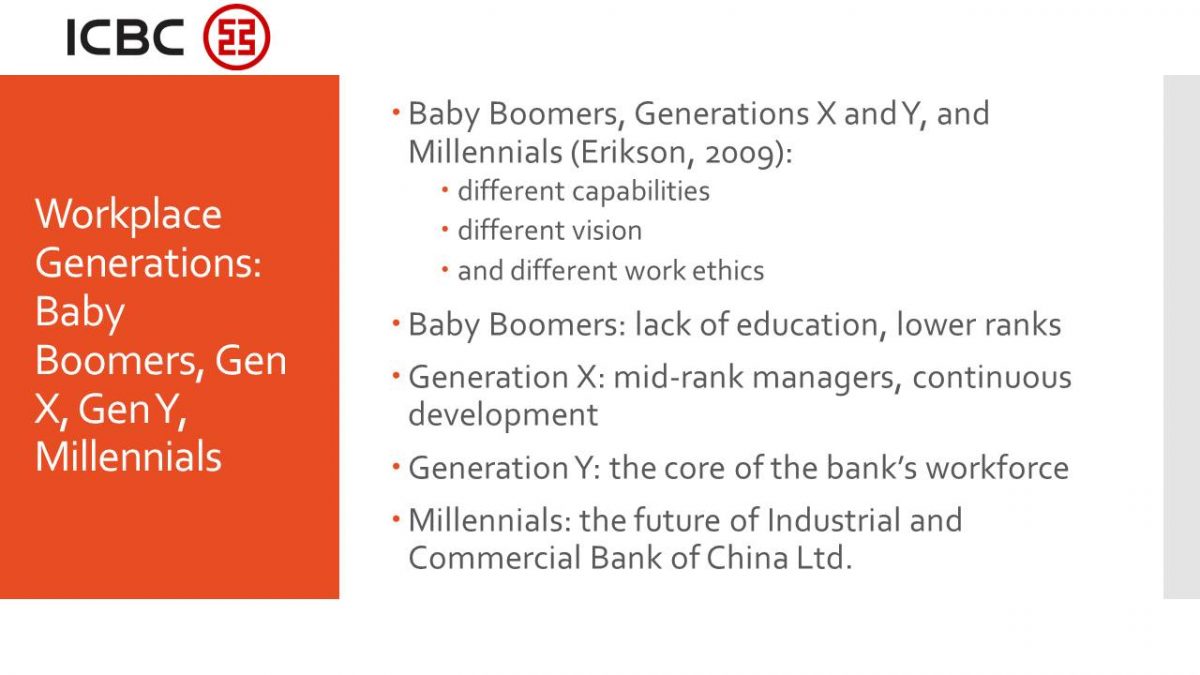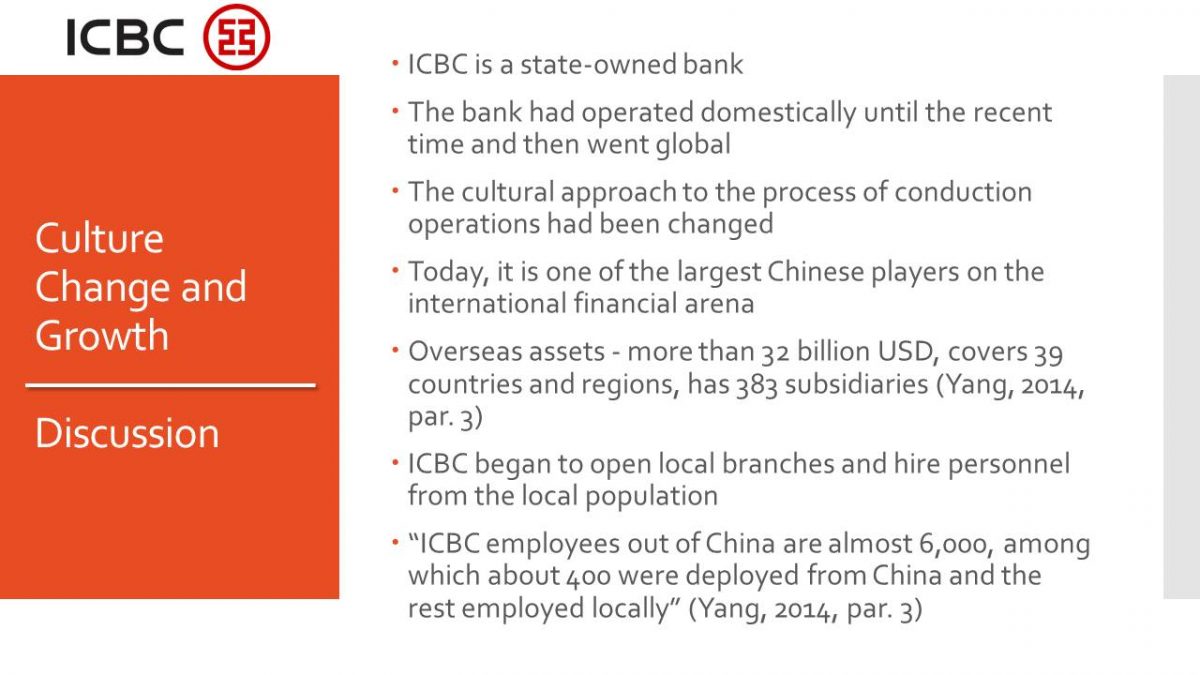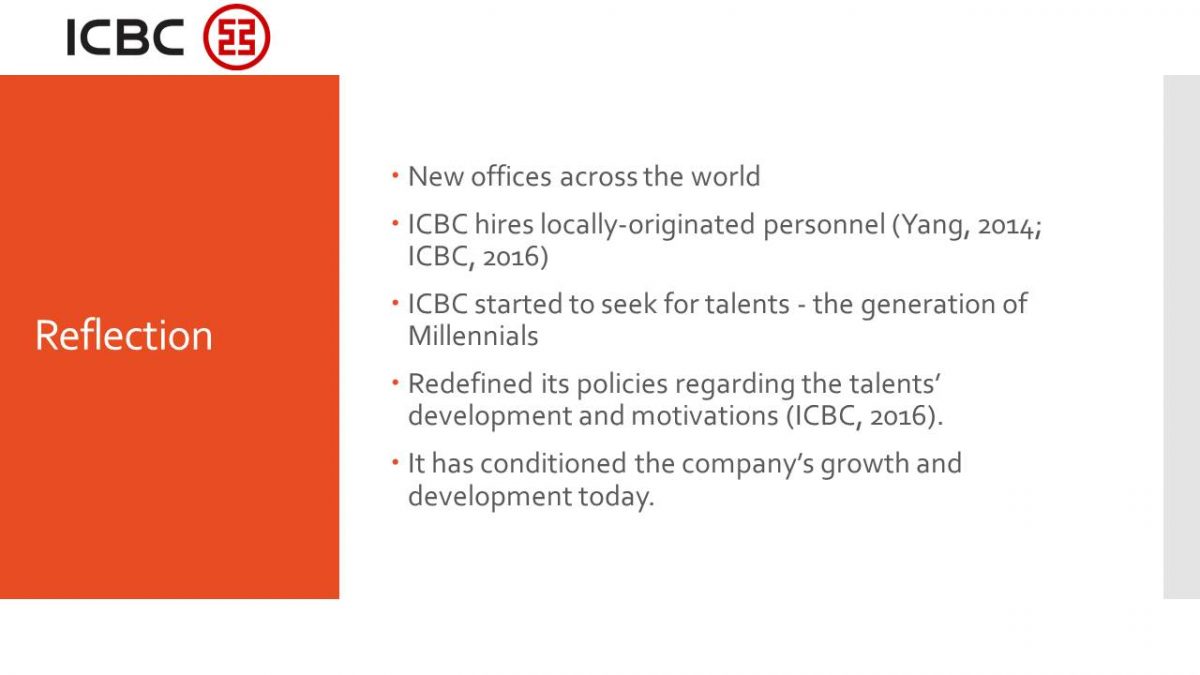Workplace Generations: Baby Boomers, Gen X, Gen Y, Millennials
- Baby Boomers, Generations X and Y, and Millennials (Erikson, 2009):
- different capabilities.
- different vision.
- and different work ethics.
- Baby Boomers: lack of education, lower ranks.
- Generation X: mid-rank managers, continuous development.
- Generation Y: the core of the bank’s workforce.
- Millennials: the future of Industrial and Commercial Bank of China Ltd.
China’s modern history has several turning points that changed its political and economic situation rather significantly.
Baby Boomers, Generations X and Y, and Millennials are very different in terms of the workplace generations’ capabilities, vision, and work ethics (Erikson, 2009).
Baby Boomers, due to the lack of education mostly, were not able to reach managerial ranks in the history of the bank.
Generation X representatives were more adapted to the requirements of the emerging new banking system, so they were qualified to be mid-rank managers who had to develop with the development of the banking system in China.
Generation Y is the most prominent and professional group of the relatively young executives, managers, and specialists who constitute the core of the bank’s workforce today (Erikson, 2009).
Millennials are the future of ICBC as they will become the most qualified and well-prepared specialists to the quickly-changing situation in the financial world (Haworth, 2015).

Culture Change and Growth. Discussion
- ICBC is a state-owned bank.
- The bank had operated domestically until the recent time and then went global.
- The cultural approach to the process of conduction operations had been changed.
- Today, it is one of the largest Chinese players on the international financial arena.
- Overseas assets – more than 32 billion USD, covers 39 countries and regions, has 383 subsidiaries (Yang, 2014, par. 3).
- ICBC began to open local branches and hire personnel from the local population.
- “ICBC employees out of China are almost 6,000, among which about 400 were deployed from China and the rest employed locally” (Yang, 2014, par. 3).
ICBC is a state-owned bank that had operated on the domestic market mostly in the previous decades. The company had to change the cultural approach essential for the national, domestic companies to the multicultural, diverse cultural approach to the business conducting process in order to consider the local peculiarities of the countries where ICBC operates now. According to Yang (2014), “by the end of 2012, according to its own statistics, its overseas assets reached more than 32 billion USD, up from 3.6 billion USD in 2000, covering 39 countries and regions,383 subsidiaries” (par. 3).
The shifted focus of ICBC’s policy became the major contributor to the growth of the company on the international market and the subsequent cultural changes. ICBC developed the following approach to solving the issue of the need in changes. It began to open local branches and hire personnel from the local population. According to Yang (2014), “ICBC employees out of China are almost 6,000, among which about 400 were deployed from China and the rest employed locally” (par. 3). It became the key to success in this endeavor.

Reflection
- New offices across the world.
- ICBC hires locally-originated personnel (Yang, 2014; ICBC, 2016).
- ICBC started to seek for talents – the generation of Millennials.
- Redefined its policies regarding the talents’ development and motivations (ICBC, 2016).
- It has conditioned the company’s growth and development today.
The company opens new offices across the world and hires locally-originated personnel (Yang, 2014; ICBC, 2016).
ICBC started to align its policies according to the world’s best practices and began to manage risks considering the context of multiculturalism.
Finally, ICBC started to seek for talents (from the generation of Millennials) and redefined its policies regarding the talents’ development and motivations (ICBC, 2016).

References
Erikson, T. (2009). Generations in China. Harvard Business Review.
Haworth. (2015). A shifting landscape: Chinese millennials in the workplace. Web.
Yang, L. (2014). How can China’s largest commercial bank grow into a real multinational? Forbes.